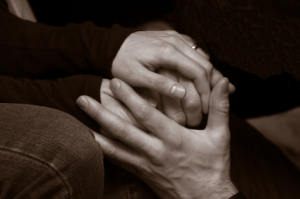- Calls to this hotline are currently being directed to Within Health, Fay or Eating Disorder Solutions
- Representatives are standing by 24/7 to help answer your questions
- All calls are confidential and HIPAA compliant
- There is no obligation or cost to call
- Eating Disorder Hope does not receive any commissions or fees dependent upon which provider you select
- Additional treatment providers are located on our directory or samhsa.gov
Supporting Loved Ones Who Have Eating Disorders During the Holidays

Contributor: Staff at McCallum Place
Whether you are caring for or supporting someone living with an eating disorder, you may be doubting your ability to provide what your loved one needs. The holidays may prove an especially difficult time for your loved one fighting eating disorder, as this season brings several food-centered celebrations.
Many people struggle to maintain their emotional and physical health during fall and winter, and individuals who suffer from eating disorders are no exception. Support can come in many forms and is integral to your loved one adhering to eating disorder treatment and remaining on the path to recovery.
The loved ones of someone who suffers from an eating disorder may unintentionally enable their loved one’s behaviors. A study in Eating Disorders showed that these behaviors frequently caused caregivers to experience long-term feelings of disempowerment, blame, fear, and low self-efficacy.
To best help your loved one, you should educate yourself on the subject and be aware of how you can give your loved one what they need to manage the effects of an eating disorder during the holidays. You should aim to ensure that you are respecting your loved one’s needs and have their best interests in mind.
Do not exclude them from holiday gatherings
While the social events that go along with the holidays may be stressful for your loved one, you should not exclude them from gatherings or celebrations. This may trigger feelings of alienation, shame, and sadness, which may cause your loved one to experience an increase in eating disorder symptoms.
If your loved one opts out of or chooses to partially participate in certain celebrations, you should respect that this is for their own mental health and recovery efforts. You can encourage your loved one to attend gatherings according to their comfort level. If you feel strongly that they should attend a certain event, be open and honest about your request while also remaining gentle with their feelings.
Take time to listen to their concerns about their eating disorder and the holidays
The holidays can be a busy time that puts many people in a rush to buy gifts, make meals, and host get-togethers. While generosity is most often at the center of these holiday tasks, the chaos often causes some chores to be forgotten. This may mean that you are not taking the time to listen to your loved one and their concerns about the holidays.
You may not agree with your loved one’s views on their body or their food habits, and you typically will not have all the answers they need. However, you can hear what they have to say and help them feel valued. This can make all the difference in supporting your loved one’s needs during this time of year.
Express your feelings about participating in the holidays
 The natural next step after listening to your loved one is talking to them. Expressing concern for your loved one is a crucial part of helping them understand how the effects of an eating disorder impact those around them. While you should verbalize these issues to your loved one, your statements should not come across as blaming them or being hurtful toward them. This would cause your loved one to feel unsupported and alienated by their struggles with an eating disorder.
The natural next step after listening to your loved one is talking to them. Expressing concern for your loved one is a crucial part of helping them understand how the effects of an eating disorder impact those around them. While you should verbalize these issues to your loved one, your statements should not come across as blaming them or being hurtful toward them. This would cause your loved one to feel unsupported and alienated by their struggles with an eating disorder.
If this conversation focuses on blame, your loved one may even isolate themselves from others during the holiday season. Research from Current Psychiatry Reports states that your conversation should not convey distress or excessive anxiety, as these behaviors can trigger similar feelings in your loved one.
Again, be gentle when articulating how you feel about your loved one’s eating disorder. This will help calm their own fears while also conveying that you are concerned about their well-being.
The holidays have the potential to cause significant stress, meaning that your support and concern are even more important to an individual who is living with an eating disorder. The best way to help your loved one is by educating yourself in order to assist them throughout the treatment process. During this time of year, your loved one can benefit from your relationship’s strength and the care you have to offer.
References:
National Association of Anorexia Nervosa and Associated Disorders. (2019). How to help a loved one. Retrieved from https://anad.org/education-and-awareness/about-eating-disorders/how-to-help-a-loved-one/.
Stillar, A.; Strahan, E.; Nash, P.; Files, N.; Scarborough, J.; Mayman, S.; … and Lafrance Robinson, A. (2016). The influence of carer fear and self-blame when supporting a loved one with an eating disorder. Eating Disorders, 24(2), 173-185. doi: 10.1080/10640266.2015.1133210.
Treasure, J. and Palazzo-Nazar, B. (2016). Interventions for the carers of patients with eating disorders. Curr Psychiatry Rep, 18, 16. doi: 10.1007/s11920-015-0652-3.
About The Sponsor
McCallum Place is an eating disorder treatment center with locations in St. Louis, Missouri, and Kansas City, Kansas.
The opinions and views of our guest contributors are shared to provide a broad perspective of eating disorders. These are not necessarily the views of Eating Disorder Hope, but an effort to offer a discussion of various issues by different concerned individuals.
We at Eating Disorder Hope understand that eating disorders result from a combination of environmental and genetic factors. If you or a loved one are suffering from an eating disorder, please know that there is hope for you, and seek immediate professional help.
Published October 1, 2020, on EatingDisorderHope.com
Reviewed & Approved on October 1, 2020, by Jacquelyn Ekern, MS, LPC

The EatingDisorderHope.com editorial team comprises experienced writers, editors, and medical reviewers specializing in eating disorders, treatment, and mental and behavioral health.

